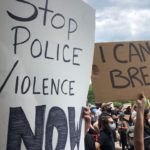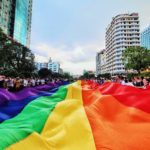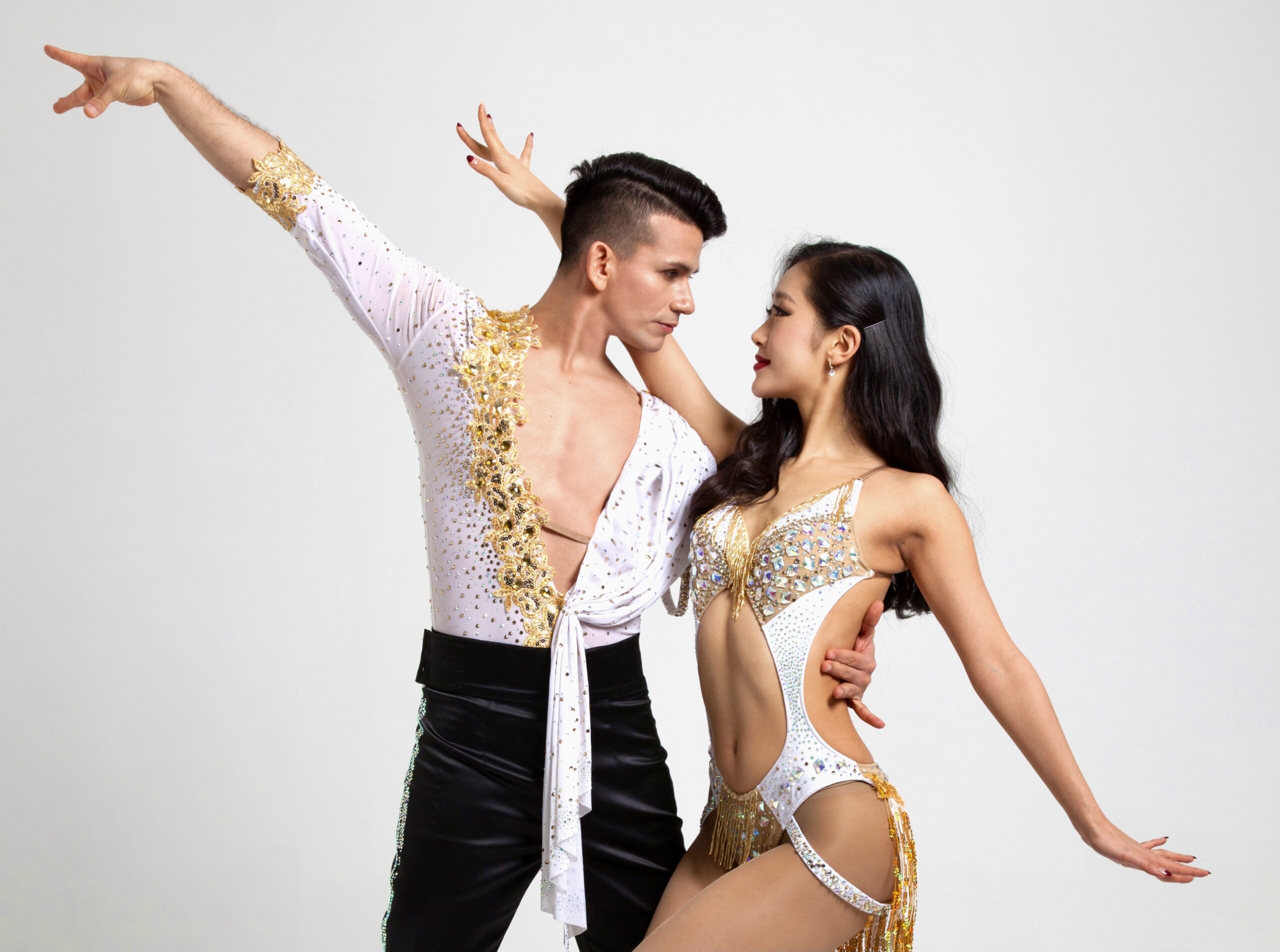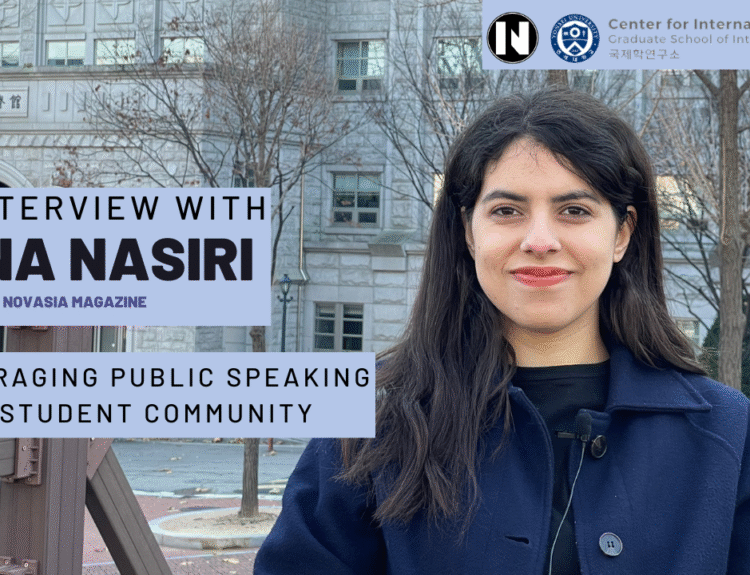The first half of 2020 has been wrought by unprecedented global affairs and political tensions. While we were eager to kick off a new decade, the world soon faced a global pandemic, massive job losses, an impending recession, and heightened community separation. These anxieties have created a perfect storm for political unrest, and it has never been clearer that the political leaders of the world that we are expected to look towards in times of uncertainty are lacking in leadership, refuse to admit responsibility, and are apathetic towards their societies.
Last month, tensions hit its peak in several countries as a series of protests broke out around the globe. At the end of May, Hong Kong’s protests continued in outrage as Beijing announced a new law be written to extend Chinese mainland security practices to the island. In response, the presence of armed police officers increased around government complexes to quash disorder. Meanwhile, in the US, George Floyd, an African American man was murdered by a White police officer who knelt on Floyd’s neck for over eight minutes. Within Sydney’s CBD, an Indigenous youth was deliberately tripped and slammed face-first by a police officer into a brick pavement despite appearing non-threatening (the Chief Police Commissioner defended the officer by saying he was just “having a bad day”).
More than just police brutality and race, these issues highlight how institutions and systems continue to betray citizen’s rights to freedom and democracy. The structures which were instituted to protect its people have become one of fear and unrest. In a separate article, NOVAsia Editor in Chief writes about #BlackLivesMatter, police brutality, and the larger systems of oppression.
Here, I want to present my perspective as an Asian Australian on what these issues mean, and why it is important to support them. The rhetoric surrounding how to support #BlackLivesMatter has been repeatedly echoed across social media, but there have been fewer voices on why it matters for Asian diaspora to aid in dismantling unequal systems of power and racial hierarchy.
Asians have an extended history in Australia, with socio-political issues that parallel those existing in Black/Blak communities. I hope that my words will help fellow Asian Australians understand our history, empathize with these issues beyond an Instagram hashtag, and diversify the dialogue.
The Asian population in Australia is significant. According to the latest Census (2016), nearly 49 percent of all Australians are born overseas (first generation Australian) or had one or both parents born overseas (second generation Australian). The Australian Bureau of Statistics does not collect information on races or ethnicities, but it does collect data on distinct ancestries of the population. Within this ‘overseas born’ population, Australians of East, South-East, Southern, and Central Asian descent constitute some 39.7 percent. Then, within the overall population, Asian Australians constitute an estimated 16.3 percent, comparatively higher than America’s 5.6 percent, or Britain’s 7.5 percent (when ratioed against the country’s total population).
The first wave of Asian immigration to Australia brought Chinese migrants seeking the promises of the gold rushes as early as 1818, peaking in the 1850s, and long before the country’s federation in 1901. Later, in the aftermath of the Vietnam War, the 1970s saw the largest intake of Vietnamese refugees, and these days the country abounds with international students from India, Indonesia, Malaysia and China. Since the early beginnings, Asians have been woven into the fabric of Australian society.
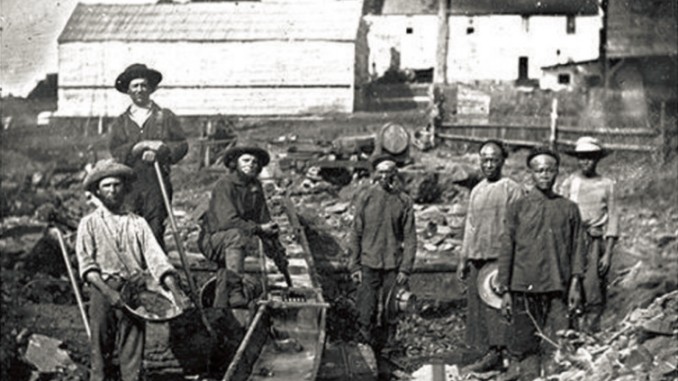
Chinese gold miners. Image via welcometochina.
This has never been more apparent than today, when a stroll down the main strip of any of Australia’s major cities is likely to offer a variety of Asian cuisines and overlapping languages. Traverse any rural town in Australia and you are likely to find the following: a post office, a petrol station, a bakery stocked with meat pies and vanilla slices, an Indian restaurant, and a Chinese takeout joint.
Seemingly, Australia enjoys diversity and representation. But while it touts itself as a successfully ‘multicultural’ country, its understanding and acknowledgement of non-White culture rarely extends past the surface. At the macro level, Australia’s institutions and policies have been accused of remaining ‘too white.’ Just four percent of Australian federal ministers are of non-European heritage, but ex-Prime Minister Malcolm Turnbull was quick to proclaim Australia as “the most multicultural society in the world.” The institutions themselves responsible for inciting change certainly do not represent the society’s cultural diversity. In fact, anti-Chinese sentiments in the 1880s were so high that upon federation, the Immigration Restriction Act 1901 (otherwise known as the ‘White Australia policy’) was enacted to ban non-Europeans from migrating to Australia. It took between 1949 and 1973 for governments to progressively dismantle these policies.
After the dismantling of the White Australia policy, amidst refugee mass migration, Vietnamese communities in the 1970s were targeted by police forces over drug smuggling and gang wars. Regardless of members who participated in organized crime, “a mix of aggressive policing [and] government intervention,” targeted and villainized civilians of the Vietnamese community. A discussion paper by the Parliamentary Joint Committee on the National Crime Authority notes that there was “a lack of Vietnamese police officers, consequent language barriers, and a common mistrust of police and other government agencies by migrants from Vietnam.”
Between 2007 and 2010, racially motivated crimes and robberies against Indians in Australia were widely publicized. At the time, Indian students were the second-largest group of international students studying in Australia. Discrimination against students and exploitation in housing and jobs soon extended to repeated assaults on Indian taxi drivers. Attacks on taxi drivers became so frequent that the government-mandated all drivers to have safety shields in their taxis. The federal government expressed regret for the attacks but did not state whether they considered the attacks to be racially motivated. The attacks and the government’s lack of response were met with protests.
Today, racism and xenophobia continue to run rampant within the government. Most famously, right-wing Senator Pauline Hanson announced in her 1996 maiden speech in Parliament that Australia was in danger of being “swamped by Asians,” and has repeatedly called to ban the burqa and all things Halal since 2017. She even proposed an ‘It’s OK to be white’ motion in 2018, intending to acknowledge the “deplorable rise of anti-white racism and attacks on Western civilization.”
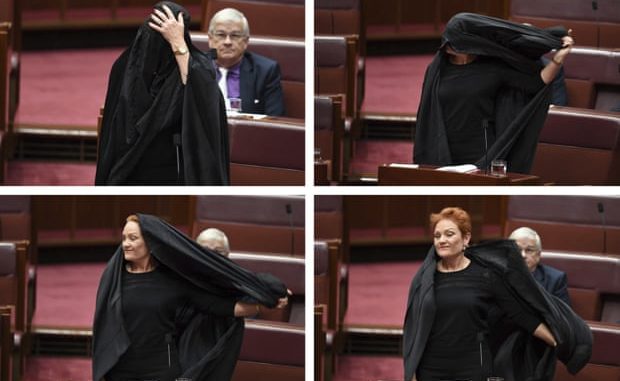
Pauline Hanson wears burqa to the Senate. Image via The Guardian.
Major Australia radio and TV stations have been repeatedly criticized for making offhand racially charged comments about prominent Asian figures. In June 2019, the highest-rated television network in Australia made international headlines for airing racist and xenophobic jokes about the Korean musical septet BTS, poking fun at North-South geopolitical tensions, while degrading and feminizing BTS’ advocacy activities. A spokesperson of the TV station issued an apology that was no apology at all: “As a light-hearted entertainment program, it is our belief that last night’s episode of ’20 to One’… did not breach any broadcast regulations, and was intended to humorously highlight the popularity of the group.”
Most recently, Asian Australian communities have been overwhelmed with racial tensions and abuse amidst Coronavirus.
While the events mentioned have been Asian Australian centric, the same underlying issues continue to plague other people of color: police brutality, political apathy, government-mandated laws to reject non-White communities, xenophobic representations in media, and racial ceilings.
If you have had any feelings of outrage or disbelief while reading the events in this article, I now ask you to consider these same events while replacing the Asian community with Black, Indigenous, Middle Eastern, South American, and other non-White communities.
It is true that Asian Australians today enjoy a comparatively free and accepted existence. We have reached the point that we need not worry about our survival, privileged enough to now advocate for things like accurate Asian media representation. But the very same problems continue to plague Indigenous communities, and refugees from Sudan, Somalia and Syria. Just as they villainized Asians, the government and media narrative towards Sudanese youths portray them as troublemaking gangs. Somalis grapple with the stereotype of ‘pirates’ and battle chronic unemployment. Syrian refugees face Islamophobia and fears of ‘boat people’. Indigenous communities remain as having the highest incarceration rates of all Australians. They lack support for medical care, education, and infrastructure, while private corporations continue to steal their sacred land.
The cycle of structural oppression will continue until we are able to reform the societies, governments, and institutions themselves. This is why protests have exploded around the world, especially during a time of unrest. This is why George Floyd’s murder broke the already-politically-tense-camel’s back. This is why it is important to understand and support movements like #BlackLivesMatter even if it does not relate to us culturally or racially.
Because this is not just about race, this is about the overall systems and laws which privilege some people while failing to protect others.
Just because Asian Australians no longer share the same struggles, does not mean we are absolved of our responsibilities in supporting other communities to achieve equality and justice. Australia began as a penal colony, and all of us (bar Indigenous Australians) were migrants seeking a better life and future.
This is why we need to care. This is why we need to change.
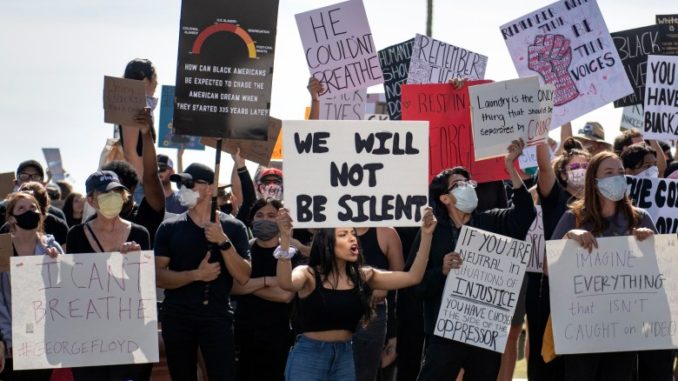
Photo by Mindy Schauer, Orange County Register/SCNG.
- Not Your Punchline or ‘Happy Ending’ – the Mediatization of Asian-American Identities and Hate Crimes - March 24, 2021
- I’m Asian Australian. Why should I care about Blak Australia or Black America? - June 5, 2020
- Does Anyone Remember What Happened to Australia?: The Illusion of Social Media Activism - April 21, 2020



